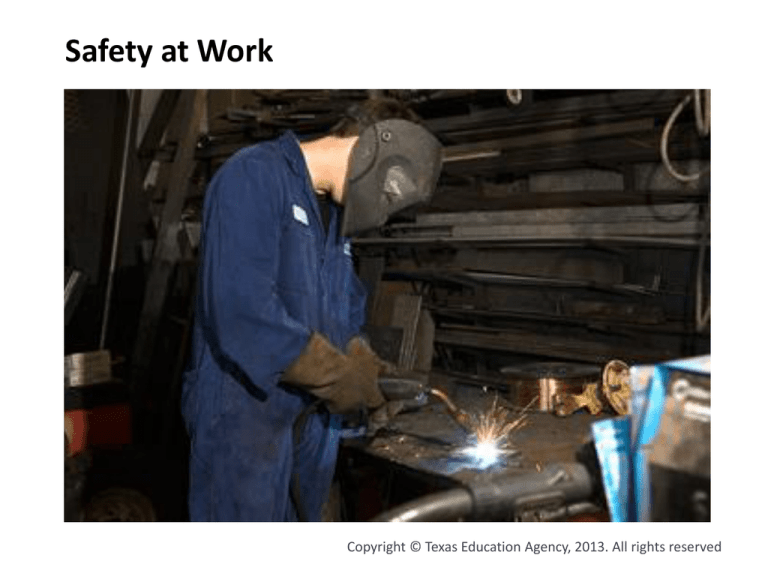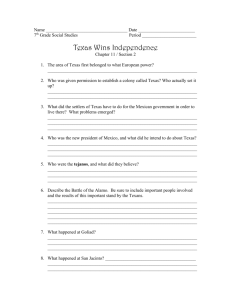
Safety at Work
Copyright © Texas Education Agency, 2013. All rights reserved
“Copyright and Terms of Service
Copyright © Texas Education Agency. The materials found on this website are copyrighted © and trademarked ™ as the property
of the Texas Education Agency and may not be reproduced without the express written permission of the Texas Education
Agency, except under the following conditions:
1) Texas public school districts, charter schools, and Education Service Centers may reproduce and use copies of the Materials
and Related Materials for the districts’ and schools’ educational use without obtaining permission from the Texas Education
Agency;
2) Residents of the state of Texas may reproduce and use copies of the Materials and Related Materials for individual personal
use only without obtaining written permission of the Texas Education Agency;
3) Any portion reproduced must be reproduced in its entirety and remain unedited, unaltered and unchanged in any way;
4) No monetary charge can be made for the reproduced materials or any document containing them; however, a reasonable
charge to cover only the cost of reproduction and distribution may be charged.
Private entities or persons located in Texas that are not Texas public school districts or Texas charter schools or any entity,
whether public or private, educational or non-educational, located outside the state of Texas MUST obtain written approval from
the Texas Education Agency and will be required to enter into a license agreement that may involve the payment of a licensing
fee or a royalty fee.
Call TEA Copyrights with any questions you have.
2
Copyright © Texas Education Agency, 2013. All rights reserved
Workplace Safety and Health Laws
Workplace safety is the responsibility of
everyone in the organization.
HR professionals do play a major role in
developing standards and adhering to legal
matters in safety.
Section 13.1.1. “Occupational Safety and
Health Administration (OSHA) Laws”
addresses workplace laws as they related to
safety.
3
Copyright © Texas Education Agency, 2013. All rights reserved
OSH Act
The Occupational Safety and
Health Act (OSH Act) is one of
the most comprehensive U.S.
laws regarding worker safety
(enacted in 1970).
The OSH Act divided
enforcement responsibilities
between the Department of
Labor and the Department of
Health.
4
Copyright © Texas Education Agency, 2013. All rights reserved
OSHA
Under the Department of Labor, the Occupational Safety and
Health Administration (OSHA) is responsible for inspecting
employers, applying safety and health standards, and levying
fines for violation.
The Department of Health is responsible for conducting
research to determine the criteria for specific operations or
occupations, and is responsible for training employers to
comply with the act.
Much of the research is conducted by the National Institute for
Occupational Safety and Health (NIOSH).
5
Copyright © Texas Education Agency, 2013. All rights reserved
Right-to-know Laws
The Emergency Planning and Community Right to Know
Act (EPCRA) was established by Congress in 1986. They
are also known as the right-to-know laws.
The purpose of this act was to require local and state
governments to provide emergency response plans to
respond to a chemical emergency.
These plans must be reviewed on an annual basis.
Companies that handle hazardous chemicals must
develop response plans and make them available to
local fire departments and state/local officials.
6
Copyright © Texas Education Agency, 2013. All rights reserved
Right-to-know Laws (continued)
A material safety sheet should be provided to employees
detailing the chemical components, health risks of the
substance, how to handle the material safely, and how to
administer first aid in case of an accident.
The data sheets should be made public too.
In some cases, state laws are different and must be
followed in addition to federal laws. In an organization, it
is the HR professional’s responsibility to be aware of
these differences, and to make sure that they are
implemented in the organization.
7
Copyright © Texas Education Agency, 2013. All rights reserved
OSHA Enforcement
Record keeping is an important aspect of
OSHA.
The aim of record keeping is to keep track of
incidence rates, or the number of illnesses or
injuries per year.
OSHA is also responsible for enforcing
standards and performing inspections.
8
Copyright © Texas Education Agency, 2013. All rights reserved
Employer sponsored safety programs
Identifying and Communication Job Hazards
The job hazard analysis technique is a safety
promotion technique that involves breaking down a
job into basic elements and then rating each element
for its potential harm or injury.
•
Technique of Operations Review (TOR) is a method
of promoting safety by determining what specific
element of a job led to a past accident.
•
9
Copyright © Texas Education Agency, 2013. All rights reserved
Employer Sponsored Safety Programs
(continued)
Reinforcing Safe Practices
•
One common technique for
reinforcing safe practices is
implementing a safety incentive
program to reward workers for their
support of and commitment to safety
goals.
•
Organizations can also target
particular types of injuries or
disabilities, especially those that could
impact employees the most.
10
Copyright © Texas Education Agency, 2013. All rights reserved
Employer Sponsored Safety Programs
(continued)
11
Promoting Safety Internationally
•
Organizations need to consider how to
ensure the safety of their employees
regardless of the nation in which they
operate.
•
Cultural differences can make this
more difficult.
•
It can be difficult because laws,
enforcement practices, and political
climates vary from country to country.
Copyright © Texas Education Agency, 2013. All rights reserved







